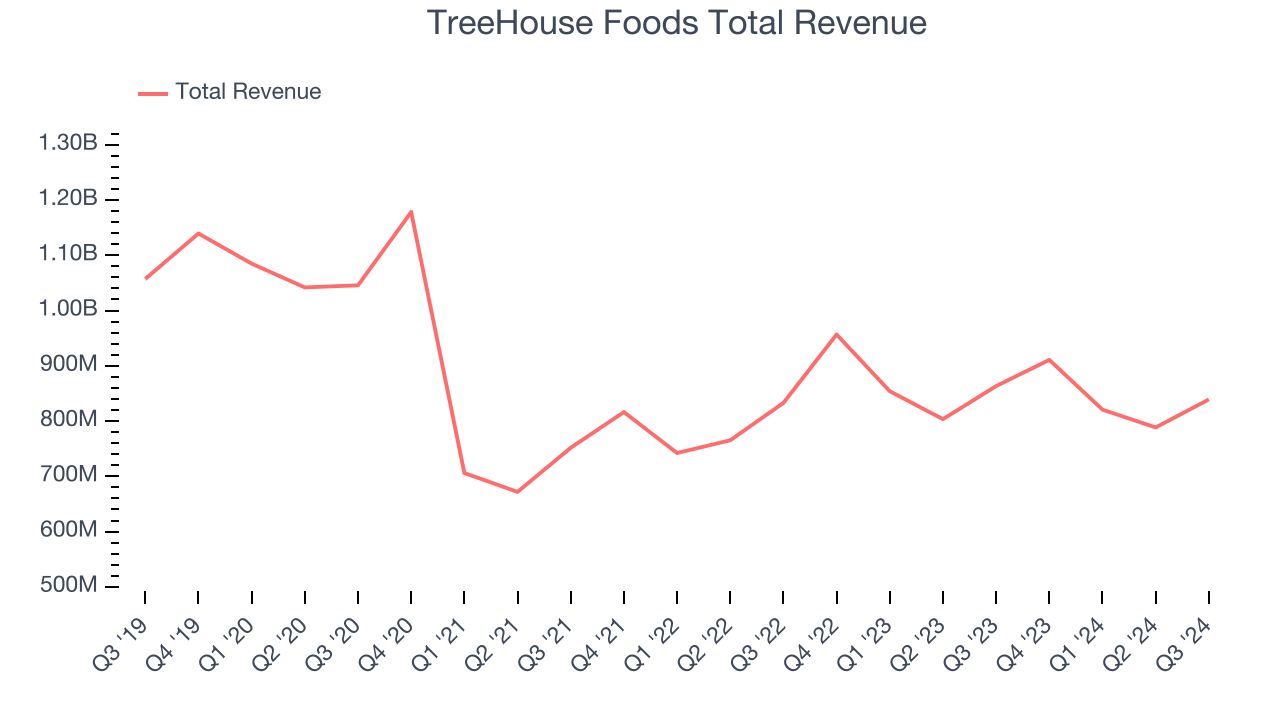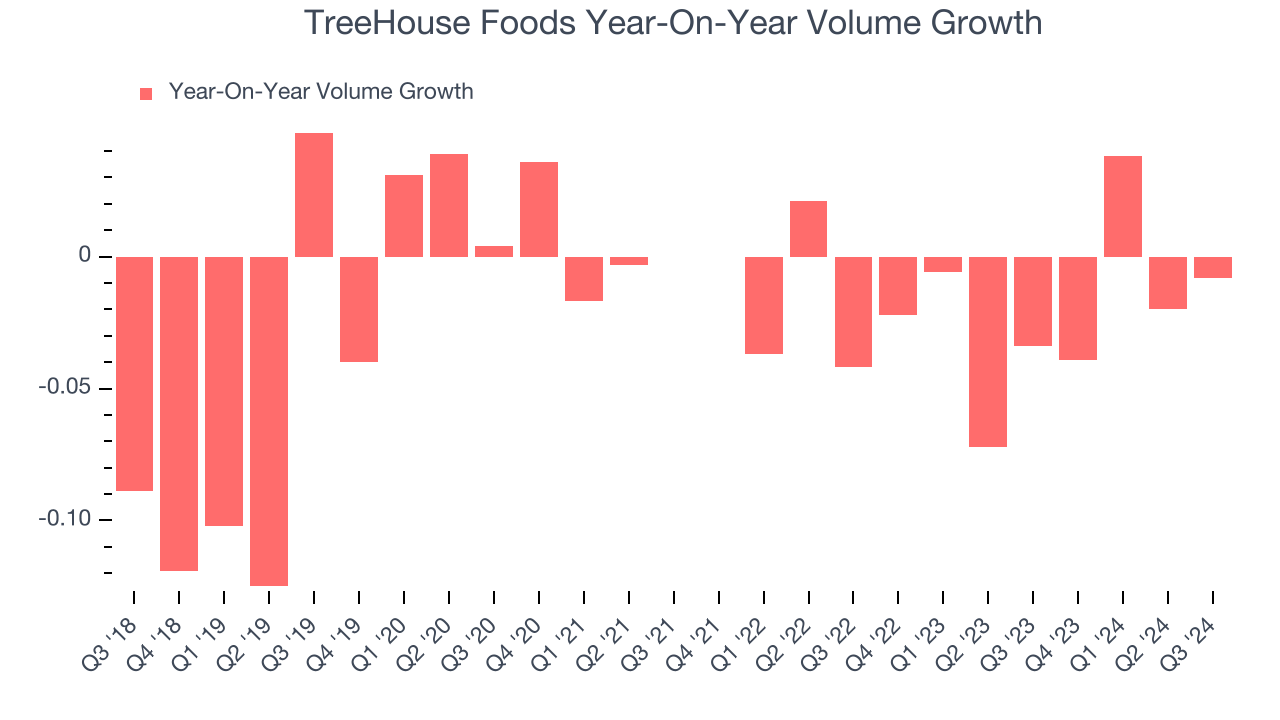
Private label food company TreeHouse Foods (NYSE:THS) fell short of the market’s revenue expectations in Q3 CY2024, with sales falling 2.8% year on year to $839.1 million. Next quarter’s revenue guidance of $915 million underwhelmed, coming in 5.7% below analysts’ estimates. Its non-GAAP profit of $0.74 per share was in line with analysts’ consensus estimates.
Is now the time to buy TreeHouse Foods? Find out by accessing our full research report, it’s free.
TreeHouse Foods (THS) Q3 CY2024 Highlights:
- Revenue: $839.1 million vs analyst estimates of $879.5 million (4.6% miss)
- Adjusted EPS: $0.74 vs analyst expectations of $0.75 (in line)
- EBITDA: $102.5 million vs analyst estimates of $103.3 million (small miss)
- Revenue Guidance for Q4 CY2024 is $915 million at the midpoint, below analyst estimates of $970.1 million
- EBITDA guidance for the full year is $340 million at the midpoint, below analyst estimates of $367.2 million
- Gross Margin (GAAP): 15.6%, down from 17% in the same quarter last year
- Operating Margin: 3.8%, in line with the same quarter last year
- EBITDA Margin: 12.2%, up from 10.4% in the same quarter last year
- Free Cash Flow Margin: 0.1%, down from 4.6% in the same quarter last year
- Organic Revenue fell 2.7% year on year (-0.6% in the same quarter last year)
- Sales Volumes were flat year on year (-3.4% in the same quarter last year)
- Market Capitalization: $1.93 billion
"Our third quarter results were mixed, as a tough operating environment with softer consumer takeaway led to sales below our expectations. However, I was pleased with our supply chain savings, which led to margin improvement and profit that was within our guidance range," said Steve Oakland, Chairman, Chief Executive Officer, and President.
Company Overview
Whether it be packaged crackers, broths, or beverages, Treehouse Foods (NYSE:THS) produces a wide range of private-label foods for grocery and food service customers.
Shelf-Stable Food
As America industrialized and moved away from an agricultural economy, people faced more demands on their time. Packaged foods emerged as a solution offering convenience to the evolving American family, whether it be canned goods or snacks. Today, Americans seek brands that are high in quality, reliable, and reasonably priced. Furthermore, there's a growing emphasis on health-conscious and sustainable food options. Packaged food stocks are considered resilient investments. People always need to eat, so these companies can enjoy consistent demand as long as they stay on top of changing consumer preferences. The industry spans from multinational corporations to smaller specialized firms and is subject to food safety and labeling regulations.
Sales Growth
Examining a company’s long-term performance can provide clues about its business quality. Any business can put up a good quarter or two, but the best consistently grow over the long haul.
TreeHouse Foods carries some recognizable products but is a mid-sized consumer staples company. Its size could bring disadvantages compared to larger competitors benefiting from better brand awareness and economies of scale.
As you can see below, TreeHouse Foods’s sales were flat over the last three years as consumers bought less of its products. We’ll explore what this means in the "Volume Growth" section.

This quarter, TreeHouse Foods missed Wall Street’s estimates and reported a rather uninspiring 2.8% year-on-year revenue decline, generating $839.1 million of revenue. Company management is currently guiding for flat sales next quarter.
Looking further ahead, sell-side analysts expect revenue to grow 5.7% over the next 12 months, an acceleration versus the last three years. This projection is above average for the sector and suggests its newer products will fuel higher growth rates.
Unless you’ve been living under a rock, it should be obvious by now that generative AI is going to have a huge impact on how large corporations do business. While Nvidia and AMD are trading close to all-time highs, we prefer a lesser-known (but still profitable) semiconductor stock benefitting from the rise of AI. Click here to access our free report on our favorite semiconductor growth story.
Volume Growth
Revenue growth can be broken down into changes in price and volume (the number of units sold). While both are important, volume is the lifeblood of a successful staples business as there’s a ceiling to what consumers will pay for everyday goods; they can always trade down to non-branded products if the branded versions are too expensive.
To analyze whether TreeHouse Foods generated its growth from changes in price or volume, we can compare its volume growth to its organic revenue growth, which excludes non-fundamental impacts on company financials like mergers and currency fluctuations.
Over the last two years, TreeHouse Foods’s average quarterly sales volumes have shrunk by 2%. This decrease isn’t ideal as the quantity demanded for consumer staples products is typically stable. Luckily, TreeHouse Foods was able to offset fewer customers purchasing its products by charging higher prices, enabling it to generate 2.3% average organic revenue growth. We hope the company can grow its volumes soon, however, as consistent price increases (on top of inflation) aren’t sustainable over the long term unless the business is really really special.

In TreeHouse Foods’s Q3 2024, year on year sales volumes were flat. This result was a well-appreciated turnaround from the 3.4% year-on-year decline it posted 12 months ago, showing the company is heading in the right direction.
Key Takeaways from TreeHouse Foods’s Q3 Results
We struggled to find many resounding positives in these results as it missed Wall Street’s estimates across all key metrics. Overall, this quarter could have been better. The stock traded down 11.3% to $33 immediately following the results.
TreeHouse Foods’s earnings report left more to be desired. Let’s look forward to see if this quarter has created an opportunity to buy the stock. The latest quarter does matter, but not nearly as much as longer-term fundamentals and valuation, when deciding if the stock is a buy. We cover that in our actionable full research report which you can read here, it’s free.
